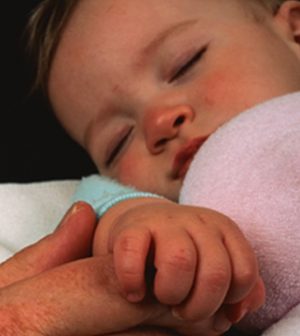- 10 Strategies to Overcome Insomnia
- Could Artificial Sweeteners Be Aging the Brain Faster?
- Techniques for Soothing Your Nervous System
- Does the Water in Your House Smell Funny? Here’s Why
- Can a Daily Dose of Apple Cider Vinegar Actually Aid Weight Loss?
- 6 Health Beverages That Can Actually Spike Your Blood Sugar
- Treatment Options for Social Anxiety Disorder
- Understanding the Connection Between Anxiety and Depression
- How Daily Prunes Can Influence Cholesterol and Inflammation
- When to Take B12 for Better Absorption and Energy
Your Baby’s Developed a Cough: Expert Advice on What to Do

If your baby has a cough, you might immediately think it’s COVID-19, but coughing is a common wintertime symptom, a pediatrician says.
Dr. Mona Patel of Children’s Hospital Los Angeles offers some advice on what to do when your baby develops a cough.
Congestion and postnasal drip will worsen the cough, especially during naps or at night during sleep, so try to keep nasal passages as clear as possible.
A cool-mist humidifier in your child’s bedroom will help moisten airways to reduce the coughing caused by postnasal drip.
Give your child lots of liquids such as water or juice. Warm, decaffeinated tea may also help ease the tickle that triggers coughing. If your child doesn’t want a drink, try a popsicle, Patel suggested in a hospital news release.
A spoonful of honey before bed can coat the throat and alleviate soreness. However, never give honey to children younger than 1 year old, and it’s not recommended for children under 2 years old. In younger babies, honey can cause botulism, a life-threatening illness.
Children’s Tylenol or ibuprofen can keep babies with a fever comfortable. Never give your toddler cough or cold medicines. They aren’t effective for young children and can cause dangerous side effects, the U.S. Food and Drug Administration warns.
For little ones who can’t blow their noses yet, use nasal saline drops and a bulb aspirator to suction a runny nose.
Patel recommended consulting your child’s doctor if the cough doesn’t improve, or in these situations:
- Onset of cough within the first few weeks of life.
- Cough with fever lasting more than five days.
- A cough lasting for eight weeks.
- A cough getting worse by the third week.
- Associated difficulty in breathing or labored breathing.
- Night sweats, weight loss, coughing up blood.
- A wet or dry, hacking cough without wheezing or fast breathing, day or night.
- A cough and stuffy nose that persist for more than 10 days without improving.
Testing is the only way to tell if a child’s cough is caused by COVID. Whether or not you think your child has COVID-19, if they are having difficulty breathing, are unresponsive or unable to eat or drink, seek immediate medical care, Patel said.
More information
For more on coughs, go to the American Academy of Pediatrics.
SOURCE: Children’s Hospital Los Angeles, news release, Jan. 31, 2022
Source: HealthDay
Copyright © 2026 HealthDay. All rights reserved.










